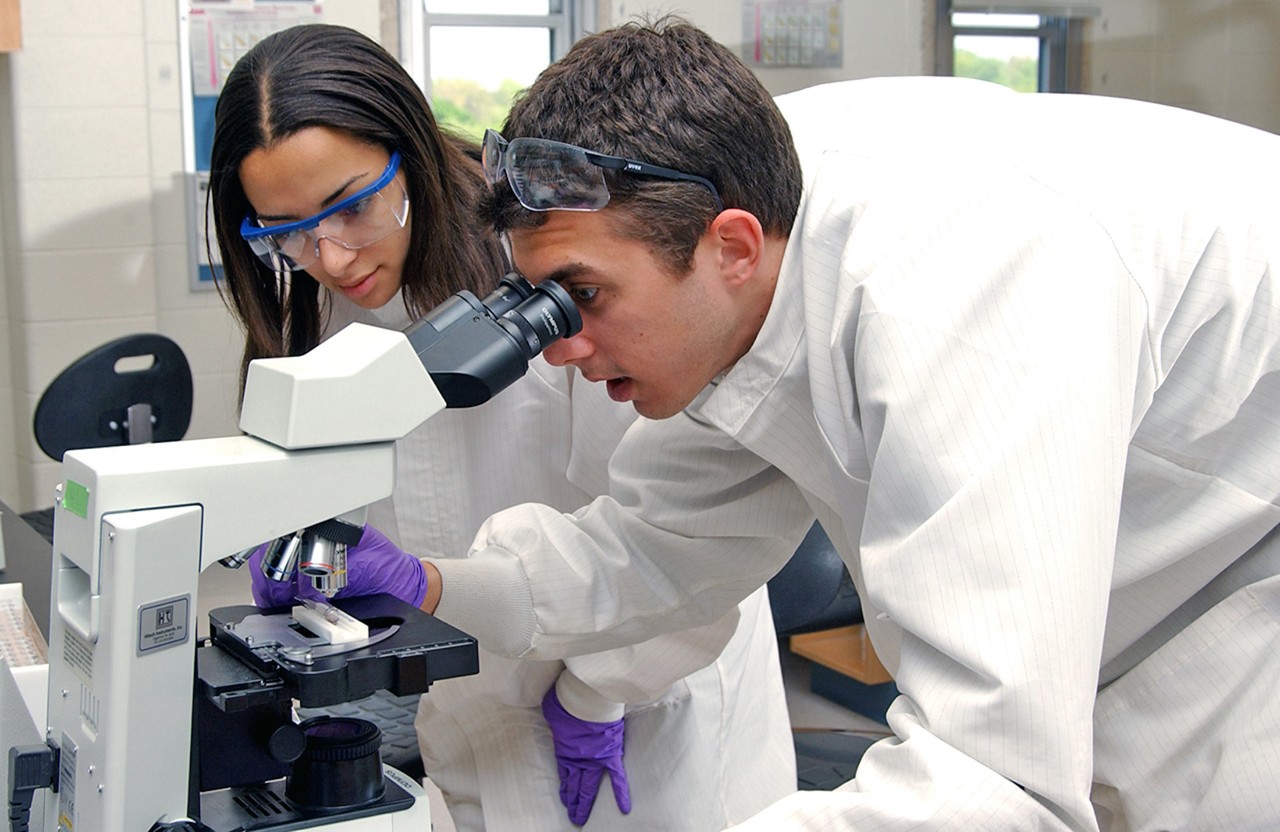
MS Medical Laboratory Science

Do you have a science degree (biology, chemistry, microbiology, etc.) and enjoy working in a laboratory? Do you want a career in healthcare where you can contribute to patient care behind the scenes? Do you enjoy problem-solving, analytical work, and working with cutting-edge technology?
If you answered yes to any of the above questions, a master’s degree in medical laboratory science may be right for you!
What is the Master's Degree in Medical Laboratory Science (MS in MLS)?
The MS in MLS is an accredited program that allows you to acquire defined bench-focused technical competency in the performance of clinical laboratory testing.
You will gain specialized, in-depth, hands-on skills preparing you to successfully enter the workforce following graduation. In addition, you will also receive training in regulatory and fiscal affairs that impact laboratory operations and management.
What Will I Learn in the MS in MLS Program?
This program combines online, hybrid, and face-to-face instruction delivered by faculty who are experts in the field. Clinical training is integrated into the curriculum and each practicum is completed at an affiliated medical center or community hospital in Delaware or the surrounding states.
Students complete a research project in an area of interest of their choice. You will formulate a question you want to answer and then design a study and conduct the necessary research to answer it. At the end of the study, you will prepare a research paper and present your findings. Read abstracts of recent projects here.
What is Unique About This Program?
- You will be prepared with well-rounded and marketable technical skills for entry-level employment
- You will be exposed to regulatory, fiscal, and operational aspects of laboratory administration
- You will have a rapid and fixed time frame to complete the degree in 18 months
- You will have guaranteed clinical training placements integrated into your curriculum
- You will be prepared to sit for the medical laboratory scientist (MLS) board of certification exam offered through the American Society for Clinical Pathology, ASCP/BOC
What Can I Do with a Degree in MLS from UD?
Completion of this program, accredited by the National Accrediting Agency for Clinical Laboratory Science (NAACLS), makes you eligible to sit for and prepares you to successfully complete the national board of certification exam in Medical Laboratory Science, MLS(ASCP).
Our graduates are eagerly sought by employers in hospital and private laboratories, as well as industrial medical and biomedical laboratories, research and fertility centers, and physician office laboratories.
Note: The MS-MLS program is not intended for those who are already certified medical laboratory scientists or who have completed a bachelor’s degree in MLS, CLS, MT, or equivalent.
Admission Requirements
- Bachelor’s degree from an accredited college or university
- Application is competitive and a minimum cumulative GPA of 3.0 is required
- Current résumé, personal statement, and two letters of recommendation
- If English is not your first language, the University requires a paper-based TOEFL score of at least 550, or at least 79 on the Internet-based TOEFL, within the last two years
- GRE is not required
Applicants must have completed the following science and math prerequisite course work regardless of previous degree:
- 16 credits of biological sciences including one semester of microbiology and a course in immunology
- 12 credits of chemistry including one semester of organic chemistry
- 3 credits of college level math or statistics.
The application deadline is January 15 for U.S. applicants, November 15 for international applicants. Classes begin Spring Semester.
The program is designed to be completed in 18 months beginning in spring, although students can personalize their degree plan to meet their needs. Program educational goals and courses can be found in the Course Catalog.
Spring 1 (15 credits)
- MMSC607/617 Clinical Physiological Chemistry I with Lab (4 credits)
- MMSC609/619 Immunohematology I with Lab (3 credits)
- MMSC623/624 Hematology I with Lab (3 credits)
- MMSC628/629 Medical Microbiology with Lab (5 credits)
Summer 1 (8 credits)
- MMSC603 Research Design (3 credits)
- MMSC691 Human Molecular Genetics (3 credits)
- MMSC602 Body Fluid Analysis (2 credits)
Fall 1 (18 credits)
- MMSC612 Body Fluid Analysis Lab (1 credit)
- MMSC620/621 Immunohematology II with Lab (3 credits)
- MMSC633/634 Hematology II with Lab (4 credits)
- MMSC636 Clinical Physiological Chemistry II (3 credits)
- MMSC637 Clinical Laboratory Instrumentation (2 credits)
- MMSC638/639 Diagnostic Bacteriology & Medical Mycology with Lab (5 credits)
Spring 2 (10 credits)
- MMSC605 Regulatory & Fiscal Issues in Laboratory Management (3 credits)
- MMSC627 Flow Cytometry (2 credits)
- MMSC693 Cellular & Molecular Diagnostic Techniques (2 credits)
- MMSC815 Contemporary Research Topics I (3 credits)
Summer 2 (12 credits)
- MMSC673 Advanced Clinical Chemistry/Body Fluid Analysis Practicum (3 credits)
- MMSC675 Advanced Clinical Hematology Practicum (3 credits)
- MMSC677 Advanced Clinical Microbiology Practicum (3 credits)
- MMSC679 Advanced Clinical Immunohematology Practicum (3 credits)
Due to a College of Health Sciences Dean’s Scholarship, the student tuition rate is lower than the published UD graduate tuition rate. The final student tuition rate for the Medical Laboratory Science program in 2025-2026 is $886 per credit hour.
Tuition remission, assistantships, and/or stipends are not available in this program. Students can apply for financial aid as applicable.
The application deadline is January 15 for U.S. applicants, November 15 for international applicants.
Classes begin Spring Semester
Virtual Open House Sessions:
TBD
